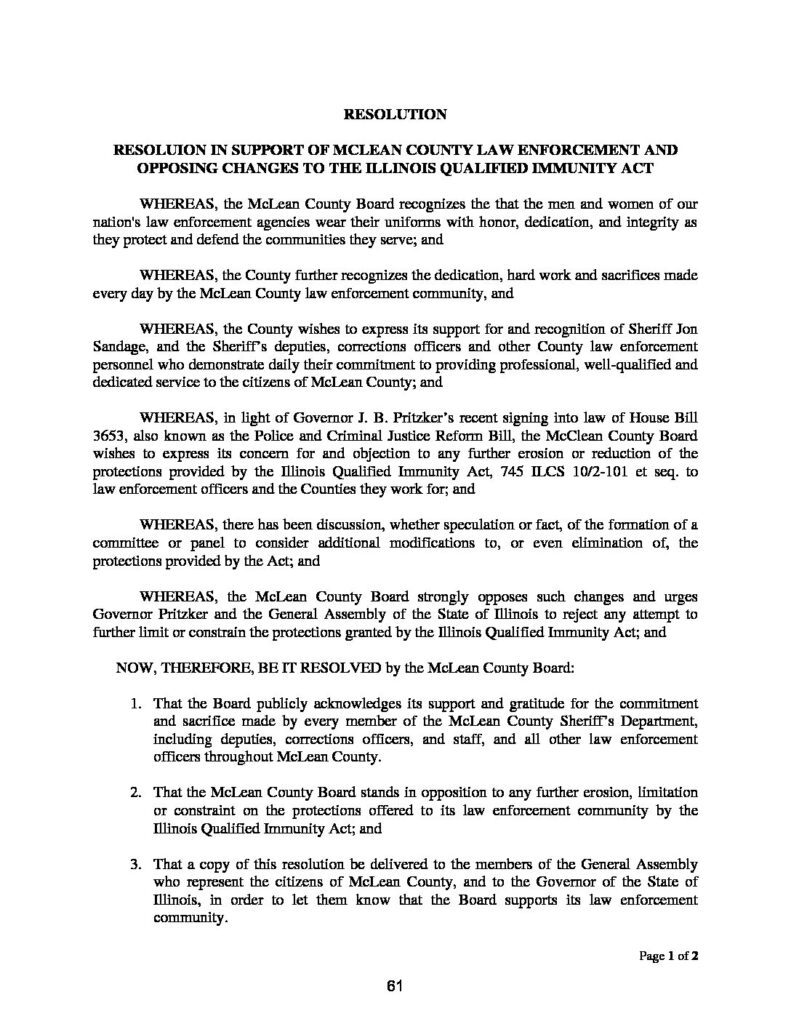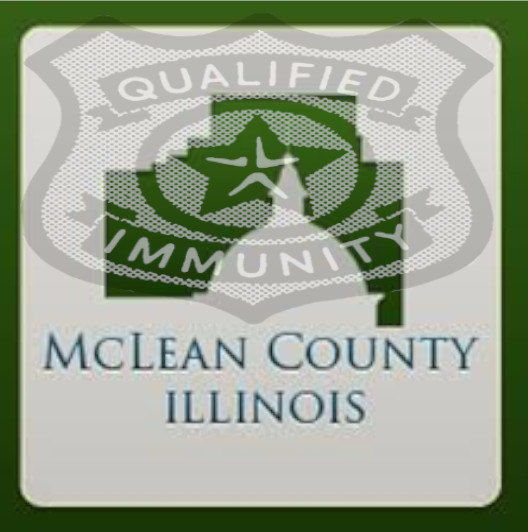The contentious debate around qualified immunity will be introduced at the McLean County Justice Committee this Tuesday, March 2nd, 2021.
Qualified immunity is a Supreme Court legal doctrine that protects individual officers from being held personally responsible if they violate a person’s rights. The bar is so high for proving an officer’s actions disqualify them from qualified immunity, that unless a previous court ruled that the exact same actions with the exact same circumstances were unconstitutional, qualified immunity will hold regardless of the underlying constitutional merits of the case.
“For example, the Ninth Circuit U.S Court of Appeals recently held that police accused of stealing $225,000 while executing a search warrant were entitled to qualified immunity because that court had ‘never addressed whether the theft of property covered by the terms of a search warrant…violates the Fourth Amendment.’ It did not matter ‘that virtually every human society teaches that theft generally is morally wrong.’”1
Sheriff Sandage has said he worries if qualified immunity is abolished, no one will ever want to be an officer again. Police unions have claimed it would become open season on officers being sued for frivolous issues. Normal Police Chief Rick Bleichner opposed abolishing qualified immunity as well.

The chair of the McLean County Justice Committee Chair, Distict 10 Board Member Chuck Erickson, introduced a resolution affirming the boards unwavering & uncritical support of law enforcement in response to Governor J.B. Pritzker signing criminal justice reform legislation in late-February. Included in the resolution is support for qualified immunity.

The law HB 3653 does not get rid of qualified immunity, but it does create a commission to study the issue and bring forth an opinion. It seems some fear it is inevitable that qualified immunity will be abolished.
Now, some individuals who are far more perfidious than I, will allege that abolishing qualified immunity will have a “chilling” effect on police officers and limit their ability and/or willingness to respond to critical incidents without hesitation. These are split-second decisions after all. Mistakes happen right? Why should police have to worry about frivolous incidents?
However, the “chilling” effect simply doesn’t hold temperature. Law professors Joanna Schwartz & Seth Stoughton carefully explain why this is.
“The Supreme Court’s constitutional standards make ample allowance for officers to make reasonable mistakes. When assessing the constitutionality of a stop, the Supreme Court has said that officers must act reasonably, but, ‘[t]o be reasonable is not to be perfect, and so the Fourth Amendment allows for some mistakes on the part of government officials, giving them ‘fair leeway for enforcing the law in the community’s protection.’ For that reason, officers can constitutionally stop or frisk someone when they have ‘reasonable suspicion,’ and that that low bar is met so long as there is a ‘moderate chance’ that the officer’s suspicion is correct. An officer can get a warrant or arrest someone when they have ‘probable cause,’ which requires only a ‘fair probability’ that they are right.
In short, officers have plenty of leeway to make mistakes without violating the Constitution. For example, courts have held that officers act constitutionally when:
-officers arrest the wrong person, so long as their mistake was reasonable;
-officers execute a search warrant on the wrong apartment, so long as the apartment numbers were similar;
-officers pull someone over for having an air freshener attached to their rearview mirror and not having a front license plate—neither of which was illegal—so long as the officer had a reasonable but mistaken understanding of the lawQualified immunity does not protect officers who make reasonable mistakes because reasonable mistakes do not violate the Fourth Amendment in the first place. Instead, qualified immunity shields government officials from liability when they have acted unreasonably (taking into account the deference that the Supreme Court has built into that term)—so long as there isn’t another court decision holding virtually identical facts to be unconstitutional. Insisting that officers are so afraid of the consequences for their unreasonable actions that they will refuse to do their job demeans officers”
Schwartz Joanna C., & Stoughton Seth W. “The Unnecessary Protection of Qualified Immunity.” Verdict Comments, 26 June 2020.
Furthermore, McLean County already has indemnification & duty to defend clauses in their union contract. Regardless of qualified immunity, those legal mechanisms still exist to protect officers. There are legitimate reasons to indemnify and defend officers. But, is blanket indemnification truly the right way to go? If something similar to George Floyd, Breonna Taylor, or Elijah McLain occurred here, does the county really want to pay out taxpayer dollars to acts that are unreasonably unconstitutional? Perhaps a mechanism whereby in certain particularly egregious instances, the county could opt-out.
All this being said, this is simply a non-binding resolution. The county does not actually have the power to unilaterally grant their officers qualified immunity, especially if the state chooses to abolish it in the future. This resolution seems to be a performative stunt by Sheriff Jon Sandage, States’ Attorney Don Knapp, and Republican County Board members to show they support law enforcement and anyone who disagrees with this resolution does not.
The Bloomington-Normal Chapter of the Democratic Socialists of America2 released this statement encouraging the community to leave a public comment for the Justice Committee & contact County Board members to state their opposition to this resolution.
“The Bloomington-Normal chapter of the Democratic Socialists of America strongly oppose the judicial doctrine of qualified immunity. Qualified immunity does nothing but protect bad officers from accountability by preventing victims of police violence & their families from receiving just compensation for blatant constitutional violations. After a year of uprisings by Black Liberation activists & supporters of police accountability, it is in extremely poor taste to turn around & support gross abuses & violations for the police.
We would also like to point out this body does not have the power to enact qualified immunity protections for officers. Furthermore, McLean County already has indemnification & duty to defend clauses in both the Sheriff Deputies & Corrections officers union contract, which protect officers from frivolous litigation. Ending qualified immunity will not alter those protections.
Qualified immunity is bad policy, and it makes all police officers look bad by protecting the worst among them. It encourages officers to be reckless and creates a culture of impunity something which our own local sheriff has brazenly flaunted. The working people of this state support police transparency & accountability. Vote no on this resolution.”
Email Action: email camille.rodriguez@mcleancountyil.gov and admin@mcleancountyil.gov with “Public Comment for Justice Committee Meeting” BEFORE 4:30 PM on MONDAY March 1st. and tell the county board to “VOTE NO on resolution supporting Qualified Immunity.” Contact County Board members.
This article was originally published on Strangecornersofthought.com and has been updated.
- https://ij.org/frequently-asked-questions-about-ending-qualified-immunity/
- FULL DISCLOSURE: I am a member of this organization.




























